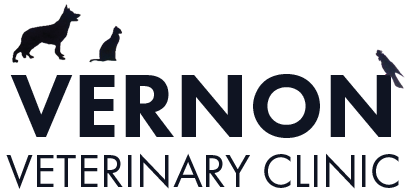Illustrated Articles
-
Cats are obligate carnivores and cannot be vegetarian. Through evolution, cats have become dependent on the specific forms of nutrients found only in animal tissue. Feeding your cat a proper diet is one of the most important aspects to help keep them at optimal health. It is important to keep in mind that the nutritional requirements and dietary preferences change over the course of the cat's lifetime. Your veterinary health care team can help you make good-quality diet choices and determine the correct number of calories your cat needs in a day.
-
Dogs are omnivores meaning that, under normal circumstances, dogs can meet their nutritional needs by eating a combination of plant and animal foods. Selecting a dog food can be a challenging task. Feeding your dog a proper diet for their life stage is one of the most important aspects to help keep them at optimal health. Your veterinary health care team can help you make good-quality diet choices and determine the correct number of calories your dog needs in a day.
-
Nutritional changes can improve the management and treatment of pancreatic diseases in cats. Diet type and pancreatitis in cats may not be as crucial as in dogs. Diet factors for managing pancreatitis, exocrine pancreatic insufficiency, diabetes mellitus, and insulinoma are discussed. Recommendations for feeding diabetic cats and approaching hypoglycemia are also described.
-
Nutritional changes can improve the management and treatment of pancreatic diseases in dogs. To prevent chronic pancreatitis relapses, diet adjustments will be necessary. Diet factors for managing exocrine pancreatic insufficiency, diabetes mellitus, pancreatitis, and insulinoma are discussed. Recommendations for feeding diabetic dogs and approaching hypoglycemia are also described.
-
Chronic kidney disease is frequently diagnosed in aging cats. Nutrition plays an important role in managing CKD in cats. Commercial diets for cats with CKD are developed support kidney function while maintaining body condition. A kidney support diet contains less protein, sodium, and phosphorus and increased omega-3 fatty acids. Your veterinarian will help you choose an appropriate formulation for your cat which will slow the progression of this disease, contributing to both life expectancy and quality of life.
-
Like dogs and people, cats are susceptible to age-related brain changes associated with Cognitive Dysfunction Syndrome (CDS). Behavioral changes such as excessive vocalization at night, having bathroom accidents, and increased anxiety are often associated with CDS, but a thorough examination must be completed to ensure that another medical reason is not the cause of the behavioral changes. Supportive care for the condition is discussed.
-
Nutrition is very important in managing cats with diabetes mellitus. Achieving a lean body condition is associated with better glucose control and an increased chance of remission. Other factors in dietary management of diabetes mellitus are discussed.
-
Chronic kidney disease is frequently diagnosed in aging dogs. Nutrition plays an important role in managing CKD in dogs. Commercial diets for dogs with CKD are developed to support kidney function while maintaining body condition. A kidney support diet contains less protein, sodium, and phosphorus, and increased omega-3 fatty acids. Your veterinarian will help you choose an appropriate formulation for your dog which will slow the progression of this disease, contributing to both life expectancy and quality of life.
-
Dogs are living longer than ever meaning that they have a greater chance of developing diseases associated with advanced age. Cognitive dysfunction syndrome (CDS) is the name assigned to a set of symptoms associated with behavior changes in senior dogs. Diets rich in antioxidants such as vitamin E, vitamin C, selenium, L-carnitine, alpha-lipoic acid, flavonoids, and carotenoids have been shown to help slow the decline of brain function. Your veterinarian can help you choose a diet with a nutrient profile suitable for your dog.
-
Colitis is a fairly common problem in dogs manifesting as diarrhea. Dealing with colitis may boil down to working with your veterinarian to find a nutrient profile that allows your dog's gastrointestinal system to function as normally as possible. A nutrient profile which contains a high quality, high digestibility protein, low to moderate fat content, and high digestibility carbohydrates. Fiber may also play a role to benefit the colon of dogs with chronic colitis. Work with your veterinarian to assess your dog's clinical and nutritional history, create a nutritional plan, and then evaluate the success of the plan.

